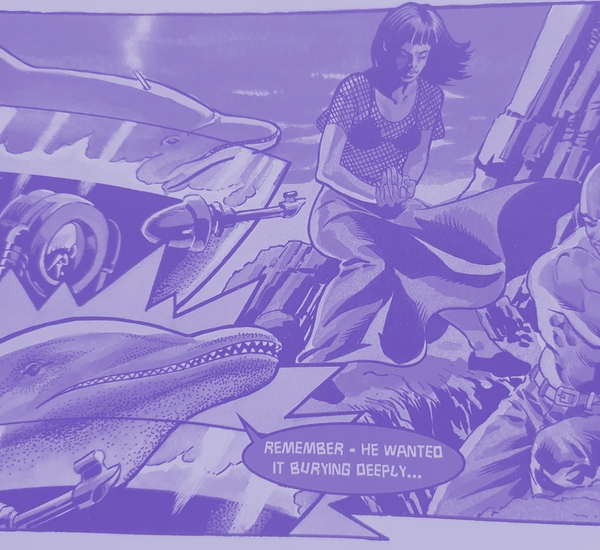Yet another Doctor Who debutant this month, with award-winning playwright Dale Smith’s first Doctor Who novel. Yes, award-winning: “Manchester Student Playwright, and Young Radio Playwright of the Year,” Smith declares proudly, “although I think the closest I got to fame was when Time Out described my play The Kissing Game as ‘frankly, bollocks’ . . . and I was on Emu’s All Live Pink Windmill Show when I was ten . . .”
Moving swiftly on . . .
Long-term readers of DWM might recall the late, lamented fiction strand Brief Encounters, to which Dale Smith contributed in the early 1990s. As Smith himself says, in Doctor Who terms he has subsequently produced “two short stories, and then a novel the very next decade.” Why take ten years before getting a novel out? “I suppose it might look strange, since I’ve written stuff for years. I think the most important thing was the sheer difference in the workload. The longest play I’ve written clocks in at about 9000 words, which is almost exactly how long my proposal for Heritage was. I wasn’t sure I had the stamina to write 90,000 words and have a full time job. As it turned out, this idea for a Doctor Who story kept nagging me . . .”
Although you might not think it from the presence of a walking, talking dolphin called Bernard, to this reader Heritage most closely resembles a western. “There was an idea of doing a western as it would have been in the real west: not a bunch of perfectly formed American accents, but a hotch-potch from all over, which is I suppose where Bernard falls in - in a real western, he’d be the stereotypical English bad guy. Alan Rickman would play him. I think Heritage actually resembles the ‘Doctor arrives in a small English village to find something is terribly wrong’ stories - Pyramids of Mars and Horror of Fang Rock especially. What it reminds me of most is Remembrance of the Daleks: the Doctor mopes about because of a decision he has to make, while Ace manages to fall into the heart of the problem through a mixture of enthusiasm and boredom, ending up right in the danger the Doctor wanted to keep her out of, because he didn’t bother to tell her. And I wanted to bring something of the idea that the Doctor actually is thousands of years old and has seen so much. Not the ‘I’m beyond human emotions - I save the world’ stuff he sometimes gets, but the sad paternal relationship he has with other species. A ‘wait until you get to my age, and then say that’ air . . . And I’m a New Adventures kid! There’s more and more of us as time goes on, you know. One day there’ll be a book written by someone who’s never even seen the TV series. I’ll leave it up to you to decide whether that’s progress or not . . .”
So, is Heritage an ambition fulfilled, or the springboard for further Doctor Who work from Dale Smith? “It was one of the most fulfilling things I’ve done, not least because I’ve managed to do something the childhood me would be envious of. I’d love to do more - in fact, given my history with audio drama, I’d love to have a go with Big Finish. We’re at a strange point at the moment - there’s less room to bring in new blood, and the audios are already notoriously difficult to get into. This is good for the audience, because you’ll get the best quality story available at the time, but it’s bad for me: if the Doctor Who world never hears from me again, it’s obviously because I never quite managed to reach that grade again. At least I’ll always have Heritage . . .”
David Darlington
